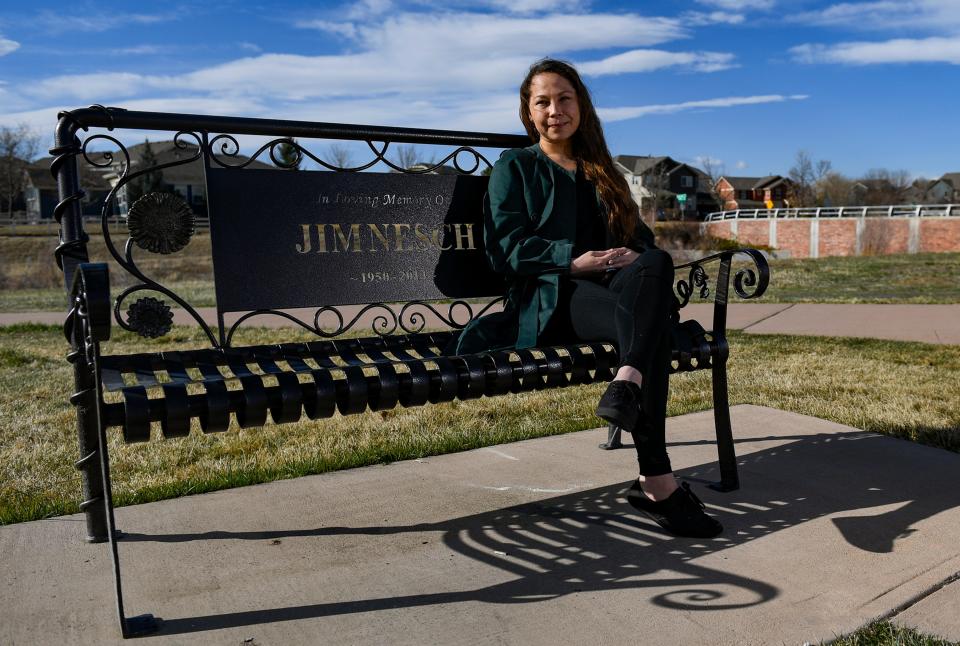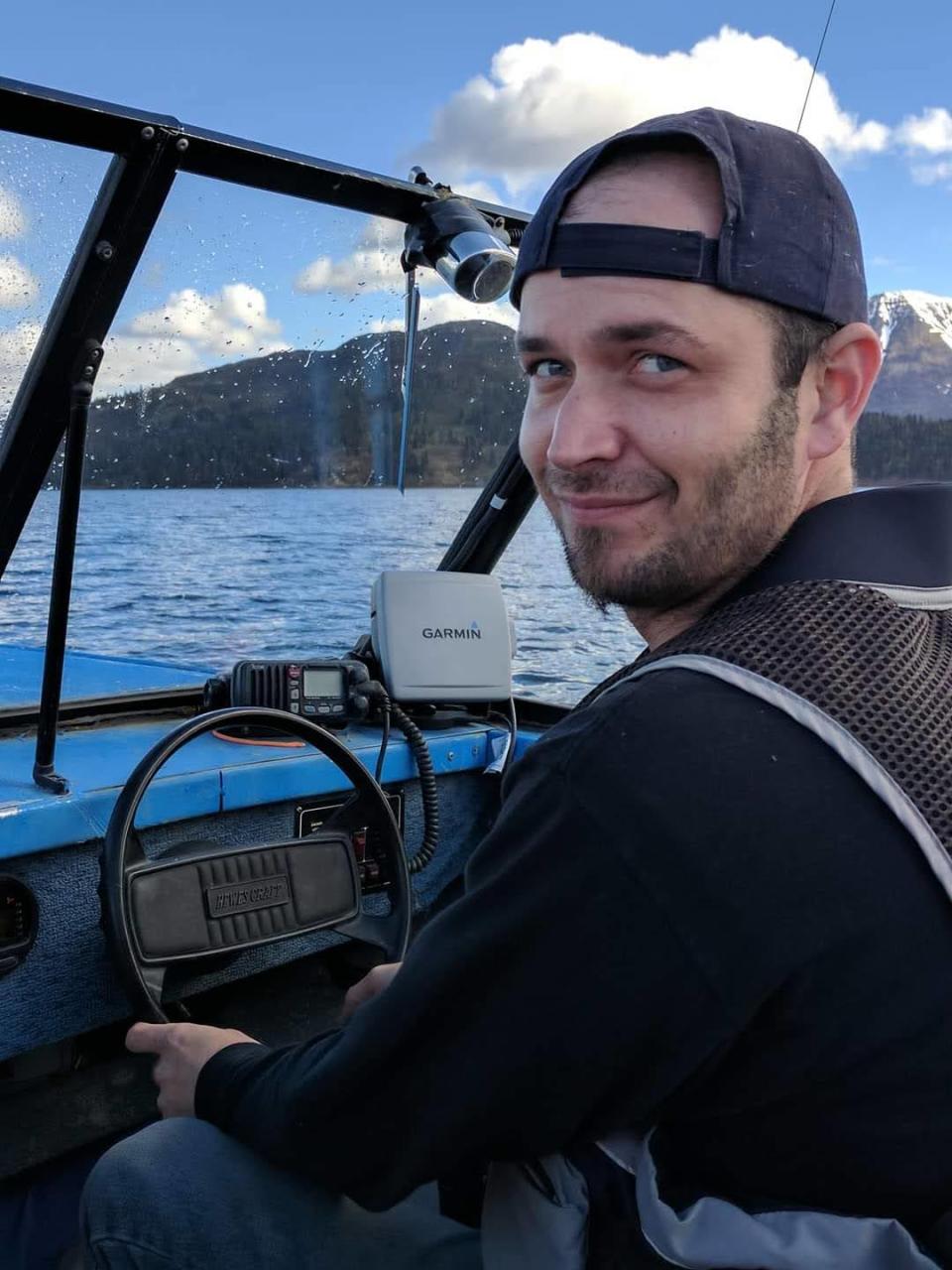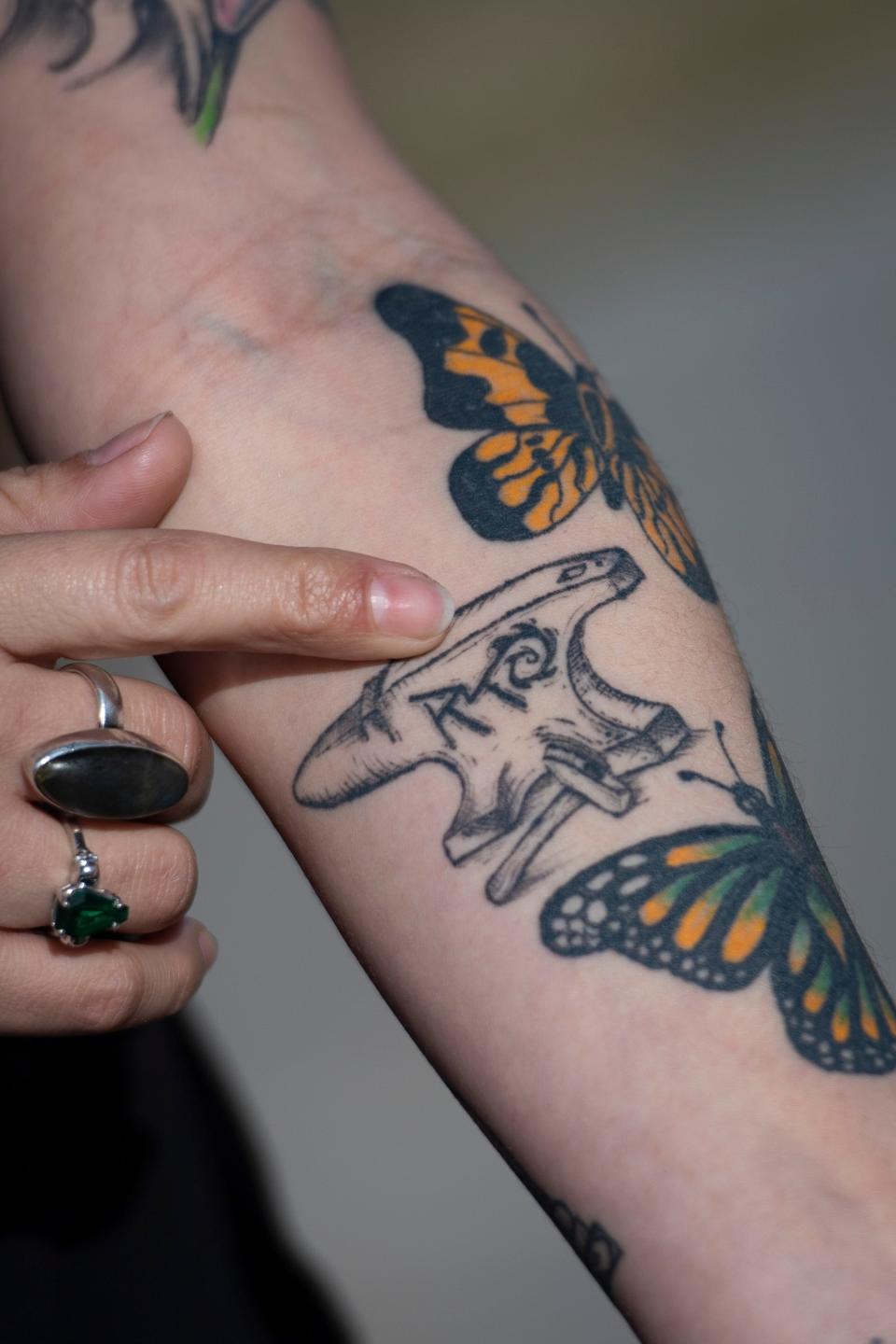As fentanyl deaths spike in Larimer County, leaders seek balance of treatment, punishment
More than three years after her husband, Ryan McMurray, fatally overdosed on fentanyl, Krystal McMurray can’t bring herself to touch the metalsmithing equipment the two used to create hundreds of pieces in their decade working together.
It’s amazing how the smell of the workshop can bring back a flood of memories, McMurray said.
But she finds comfort in seeing their work out in the community. Sometimes she'll go to the Ridgen Farm Community Garden to sit on the bench she and Ryan made together in 2014 to honor the life of Jim Nesch, who owned a brass foundry next to the couple's shop.
Ryan’s addiction was a slow progression over the 13 years they were together, McMurray said while standing next to their bench facing the community garden on a recent Saturday.
“Ryan, when we started dating, wouldn’t even drink,” McMurray said.
From USA Today: Treatment or enforcement? Record fentanyl deaths spark new debate over war on drugs

Alcohol and eventually opioids became his way of self-medicating chronic pain from a sledding accident he suffered in his childhood. The physical toll of his job as a metalsmith for a business the couple ran together didn’t help, McMurray said.
“It got to be too much,” she said.
He tried multiple forms of treatment over the years and was taking monthly injections to treat alcohol and opioid dependence prior to his death, McMurray said.
She later learned he had missed his last injection appointment.
“Toward the end of Ryan’s life I had no idea he was using,” McMurray said.
She found her husband dead in the kitchen of their west Fort Collins home the morning of Dec. 12, 2018. He died from an accidental fentanyl overdose, according to the coroner’s office.
Phone records McMurray shared with investigators revealed Ryan had purchased what he thought were oxycodone pills from a man in west Fort Collins a few days before his overdose.
Fentanyl-related overdose deaths in Colorado have increased 1,008% since 2015, according to a report from Families Against Fentanyl using data from the Centers for Disease Control and Prevention.
Ryan was one of three people in Larimer County to die of a fentanyl-related overdose in 2018, according to the Larimer County Coroner's Office. Fentanyl's death toll in the county grew to 16 in 2019 and 17 in 2020.
In 2021, 875 Coloradans died from a fentanyl-related overdose, according Rep. John Cooke, R-Greeley, a former Weld County Sheriff.
“That’s our friends, family, kids, spouses, siblings dying,” 8th Judicial District Attorney Gordon McLaughlin said. “And it’s usually because they don’t know exactly what they’re taking.”
A bill proposed in the state legislature last month aims to address the fentanyl crisis through increased criminal penalties for dealers, education and prevention initiatives, but critics say more needs to be done to deter drug use in the first place.
'Staggering' amount of fentanyl in Larimer County
Fentanyl is a highly potent, highly addictive synthetic opioid used for pain management and is 80 to 100 times stronger than morphine, according to the U.S. Drug Enforcement Administration. Because it’s cheap to produce and extremely strong, illegal drug manufacturers commonly mix it with cocaine, heroin, methamphetamines or illegally produced marijuana to increase potency and extend supply, Larimer County Sheriff's Office Capt. Joe Shellhammer said.
Fentanyl grew in popularity during the COVID-19 pandemic because it could be easily smuggled across the U.S. border with Mexico in small amounts, Shellhammer said. Pills can be pressed to look just like prescription opioid pills, some with enough fentanyl to get a person high and some with a lethal amount.
“Pills are small, they’re easy to traffic, and when someone is bringing in fentanyl, just a tiny amount ... (it) can be cut among thousands and thousands of pills, each of which could be a lethal dose,” McLaughlin said.
Overdose deaths in Larimer County have been climbing since 2018, with total overdose deaths nearing 60 in 2019 and 2020. While the coroner's office has not released official data from 2021, the sheriff's office estimates there were about 55 overdose deaths last year based on calls responded to by the Northern Colorado Drug Task Force, an interagency team that responds to all suspected drug overdoses to try and identify and file criminal charges against those who supplied the drugs.
Larimer County Sheriff Justin Smith estimates if it weren't for first responders using naloxone, a nasal spray commonly known by the brand name Narcan that's used to treat overdoses in an emergency, overdose deaths here would be in the hundreds.
The amount of fentanyl seized in recent years by the drug task force has been "staggering," Shellhammer said. Investigators seized 10,066 fentanyl pills in 2019. In 2021, they seized 155,738 fentanyl pills. Other drugs have also become more prevalent. The drug task force seized 22 pounds of heroin in 2021, up from less than a pound in 2017, Shellhammer said.
In addition to being more prolific, fentanyl cases are also becoming more complex. The district attorney's office received funding earlier this year to hire a prosecutor who will focus on fentanyl cases and other complex crimes, McLaughlin said. Investigators used to see cases where people were arrested with 20 fentanyl pills, but now are seeing more cases where people are in possession of 1,000, 10,000 or 20,000 fentanyl pills, he said.
Drug task force and federal investigators used phone records to track down the man who sold Ryan pills in 2018 and connected the same man to another fatal overdose in 2017, according to court records. He was sentenced to 20 years in federal prison in February after pleading guilty to distribution of a controlled substance containing fentanyl resulting in death.

The case took three years to investigate and prosecute, and it was the only successful fatal overdose case against a dealer prosecuted by the U.S. Attorney’s Office in Larimer County in a decade, Shellhammer said.
“You hear people say, ‘let’s go after the dealers,’ “ Shellhammer said. “Well, we did, and you’re talking hundreds of man hours just to get one prosecution."
Balancing treatment and punishment
The fentanyl spike caught everyone in the state — from law enforcement to behavioral health experts — by surprise, McLaughlin said. It's going to take a collaborative solution to solve the problems it has caused, he said.
“(My philosophy is to) make sure those people (who have addictions) have access to resources and treatments and that we’re breaking the cycle of addiction,” McLaughlin said. “... But when we’re talking about large-scale distributors that are bringing huge amounts of fentanyl and fake pills into the community, we need the resources to prosecute those people and get those people off the streets.”
McLaughlin stood alongside Gov. Jared Polis, Colorado Rep. Mike Lynch, R-Wellington, other lawmakers, law enforcement officials and elected district attorneys during a news conference in late March in support of a recently proposed state bill increasing the penalties for distributing fentanyl and providing funding for education and other harm reduction and prevention strategies.
Here's what the bill would do:
Add a criminal penalty for someone who distributes fentanyl resulting in death, a Class 1 drug felony punishable by up to 32 years in prison
Increase criminal penalties for those who possess and intend to distribute fentanyl
Require those caught with small amounts of fentanyl to attend treatment
Fund medically-assisted treatment programs in county jails
Fund an education campaign that includes providing fentanyl testing strips in schools, higher education institutions and community and religious organizations
“It’s that entire community effort that is going to take to make an impact on this crisis, because frankly we’ve never seen anything like this before,” McLaughlin said during a March 24 news conference on the bill.
The bill does not address a law change made in 2019 reducing the criminal penalty for possessing less than 4 grams of fentanyl and other illicit drugs to a misdemeanor. Critics of the 2019 legislation — including Smith — believe there needs to be harsher penalties for people possessing fentanyl as a deterrent to drug use.
“We have seen a tremendous shift in societal attitudes towards illegal drugs,” Smith said. "... When the consequence is, 'you have to go to treatment,' that's not going to deter people."
Increasing the criminal penalty would also give investigators negotiating power, Smith said. If someone is facing a longer jail sentence instead of solely court-ordered treatment or probation, Smith said they are more likely to share information on their dealer in exchange for lesser sentence. In this way, reducing the penalty for possession has made it harder for investigators to track down dealers, Smith said.
“It’s not a lock them up and throw away the key situation, by any means, but there has to be a consequence,” Smith said.
Smith said people need to look one step prior to treatment — prevention — to address the drug use and overdose problem, starting with establishing stricter penalties to deter use in the first place.
“We’re talking about trying to deal with treatment for the addicted, and that’s bailing out the ship that’s sinking,” Smith said. “We still have to patch the hole.”
A short stint in jail gives people an opportunity to detox safely and make the decision to commit to treatment, Shellhammer said.
“Once they’re incarcerated, we have an opportunity,” to start them on treatment, Smith said, through the Larimer County Jail's medically-assisted treatment program.
But the average stay in the jail for any inmate is only 15 days, Smith said, so when someone who suffers from addiction is arrested and starts the medically-assisted treatment program, they usually aren't in it for long.
The Colorado Opioid Synergy Larimer and Weld, or CO-SLAW, brings together eight clinics that provide medically assisted treatment into one program. Jail staff works with people as they are released to connect them with a clinic to help them continue their treatment.
“We know that without that support when they leave, their chance of success is extremely low,” Smith said.
More: A Larimer County Jail inmate fatally overdosed in 2020. What's being done to stop drug use?
Larimer County Commissioner John Kefalas said the jail-based medically-assisted treatment program and treatment options through Larimer County Community Corrections are good opportunities for the county to offer help for those who have ended up in the criminal justice system and hopefully prevent them from getting rearrested.
The county's behavioral health facility — which is currently under construction and set to open in 2023 — will also have a detox facility, giving law enforcement another place to bring people struggling with substance abuse instead of the jail or hospital when appropriate, Kefalas said.
'We need to make treatment available everywhere'
Emergency departments and jails continue to be the frontline of the "addiction epidemic," so continuing to provide treatment resources in those areas is important, said Lesley Brooks, chief of addiction management at SummitStone Health Partners.
"Research tells us that, no matter how you end up in treatment, that it can be effective," Brooks said, whether you're dragged there by a loved one or sentenced to a treatment program by a judge.
But its imperative lawmakers and law enforcement consider the potential impacts of their decisions, knowing "our history around the inequities that live at the intersection of race, poverty, substance use and mental health," Brooks said. "It is the gateway to mass incarceration."
"We have to make sure they're appropriately in the criminal justice system in the first place," Brooks said. "If what we do is use the criminal justice system to scoop up everybody that we think has a substance use problem, in my opinion, that's the wrong direction."
More: Investigators won't say much about recent murder arrest tied to 2016 case: What we know
People do end up in the criminal justice system because of a lack of treatment options, Brooks said, and leaning on the criminal justice system as a main entry point to behavioral health treatment can cause more harm to those individuals.
"We need to make treatment available everywhere," Brooks said. "There needs to be no wrong door to access robust treatment for mental health and substance use."
Ryan tried multiple treatments — outpatient treatment, classes, therapy, medically-assisted treatment — to try and get a grasp on his addiction over the years, McMurray said. He even put an interlock device on his own car to stop himself from drinking and driving.
"Addiction, truly at the end of the day, is a mental illness," McMurray said. "... Addiction is all-inclusive. It doesn't matter what your background is, what your education is."

While it's still too painful for McMurray to pick up the metalsmithing tools she and Ryan worked with for decades, she continues to carry his art with her wherever she goes. Tattoos on her left arm — butterflies, a starflower and his foundry mark — are all examples of his artwork, and she said she plans to keep adding to it.
"No matter where I go, he'll always be there."
Substance use and addiction treatment options in and near Larimer County
The variety of substance use and addiction treatment options can be hard to navigate. For those looking for more guidance, reach out for free to a care coordinator through the CO-SLAW program 24/7 at 1-844-944-7529. Below are some of the addiction recovery resources in and around Larimer County.
SummitStone offers a range of services, including intensive outpatient treatment, medically assisted treatment, residential treatment and peer support groups. People seeking treatment can begin same-day.
Call: 970-494-4200
Visit: summitstonehealth.org/services/addiction/adult
Locations: 114 Bristlecone Drive, Fort Collins; 1250 N. Wilson Ave., Loveland
Front Range Clinic provides medically assisted treatment and other outpatient behavioral health counseling and treatment.
Call: 970-493-9193
Visit: frontrangemd.com
Location: 1120 E. Elizabeth St., Building G, Suite 2, Fort Collins
Sunrise Community Health works with community partners to help patients address substance use along with their primary care.
Visit: sunrisecommunityhealth.org
Locations: Multiple
Salud Family Health Centers offers behavioral health services in addition to and during medical visits.
Call: 303-697-2583
Locations: Multiple
Northpoint offers inpatient and outpatient treatment.
Call: 970-671-6378
Visit: northpointcolorado.com
Location: 4565 Kendall Parkway, Loveland
Turning Point Center for Youth & Family Development provides intensive youth residential treatment and outpatient care for youths, young adults and families.
Call: 970-221-0999
Visit: turningpnt.org
Location: 1644 S. College Ave., Fort Collins
Harmony Foundation can provide evaluation and detox services, residential treatment, intensive outpatient services and other recovery support services. Staff are available to 24 hours a day, 365 days a year.
Call: 970-432-8075
Visit: harmonyfoundationinc.com
Location: 1600 Fish Hatchery Road, Estes Park
North Range offers detox and treatment services 24 hours a day, 365 days a year, including withdrawal management services.
Call: 970-347-2120
Location: 928 12th St., Greeley
Sady Swanson covers public safety, criminal justice, Larimer County government and more throughout Northern Colorado. You can send your story ideas to her at sswanson@coloradoan.com or on Twitter at @sadyswan.
This article originally appeared on Fort Collins Coloradoan: Colorado balancing treatment with punishment as fentanyl deaths climb

